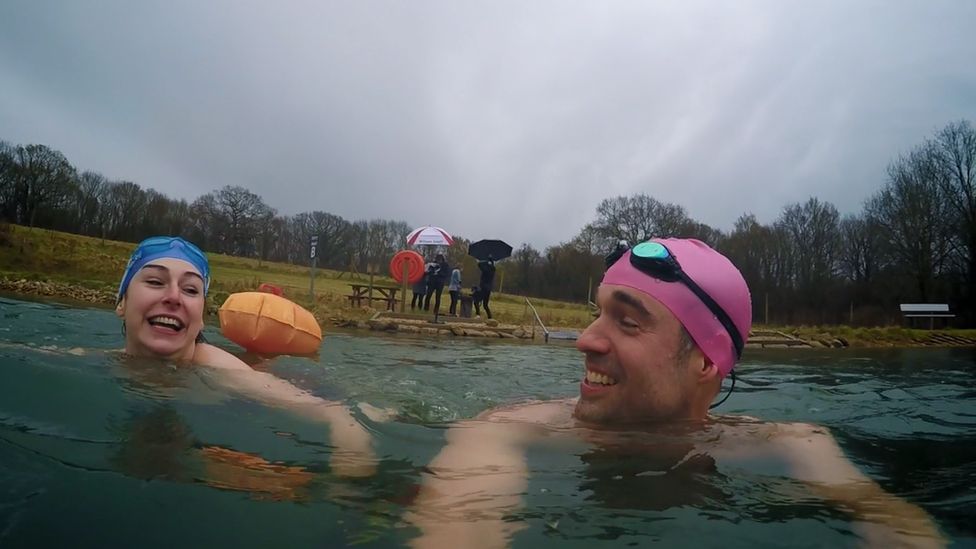Can cold water swimming treat depression?
- Published

Jumping into the sea in winter is the most alive and present I ever feel. I get in fast - a dangerous approach if you're a beginner - when the cold shock response provokes an uncontrollable urge to inhale.
Underwater, I feel an intense mixture of burning pain and, even after doing this for years, a little panic. But it's the only time the anxious negative chatter in my head is truly silenced.
After two minutes, as my skin reaches the same temperature as the water, I start to feel comfortable and my breathing slows. After even a brief swim, I feel elated for hours and calm for days.
Like many other people who swim in cold water regularly, I love it, but I also believe it has mental health benefits.
And the first case report on cold water swimming published in British Medical Journal Case Reports shows that it may be an effective treatment for depression.
Diving in
The Doctor Who Gave Up Drugs, a series broadcast on BBC One in 2016, which I developed and presented, followed Sarah, a 24-year-old who had been taking antidepressants since the age of 17.
Her symptoms had started earlier in her teens. When we met, she was desperate to stop her antidepressants, saying they put her in a "chemical fog".
She loved swimming and, because of my own experience, I approached Prof Mike Tipton and Dr Heather Massey, both scientists at the extreme environments laboratory at Portsmouth University.
I also spoke to their collaborator Dr Mark Harper, a consultant anaesthetist at Brighton and Sussex University Hospitals, to see if there was any scientific basis for trying out cold water swimming on Sarah.
Stress response
Outdoor exercise and the companionship of fellow swimmers can improve symptoms of depression and anxiety. But the team at Portsmouth believed there might be an effect of cold water immersion itself.
There is a convincing, biologically plausible, theory about how this might work.
Immersion in cold water evokes a stress response: a set of physiological and hormonal reactions that evolved millions of years ago to cope with a wide range of potential threats.
Animal attack, jumping in cold water and sitting an exam all elicit a similar response.
Heart rate, blood pressure and breathing rate all increase and stress hormones are released.
But, if you immerse yourself only a few times in water of 15C or less, this stress response is reduced.
However, it is not only the stress response to cold water that reduces with repeated immersions.
Cold water swimming - how to do it safely
- Approach it with the same caution you would exercise - if you have heart disease, start slow and warm
- Make sure you can swim and go with a friend who can swim
- Start in summer/early autumn when UK sea temperatures are 15-20°C
- Start shallow - a gently shelving beach, or somewhere with a ladder
- Go on a calm day - the initial two to three-minute period gasp when you can inhale water is the risky bit. Relax, do as little as possible and keep your head above the water for this period
- Time yourself for two to three minutes. Once your skin reaches the same temperature as the water you'll feel warm
- Six three-minute swims will have an effect on your cold shock response that will last for months. As for your mood - you'll have to be the judge until there are more studies
Check out the The Outdoor Swimming Society website for safety advice and more.
Prof Tipton and Dr Massey have shown that the response to the stress of exercising at altitude is also diminished.
This is called "cross-adaptation", where one form of stress adapts the body for another.
There is increasing evidence linking depression and anxiety with the inflammation that accompanies a chronic stress response to the physical and psychological problems of modern life.
Through cross-adaptation, cold water swimming may be able to reduce this chronic stress response together with the inflammation and mental health problems that affect so many of us.
The theory is sound, but the evidence it works is all anecdotal, apart from this case report.
Cold water swimmers describe many benefits: they never get colds and never turn the heating on in winter. Many have stories of how they came to outdoor swimming in times of grief or bereavement and found comfort, even joy, in the water.
The team at Portsmouth are starting to test these stories. A preliminary study supports the claims made about colds and further reports are being prepared about patients with a range of conditions.
'Life is good'
Since 2006, prescriptions of antidepressants have more than doubled and, while patients may take these drugs for many years, there is debate about their effectiveness.
New approaches which attempt to tackle the multiple causes of depression are badly needed.
Dr Mark Harper is cautiously optimistic. He says: "Our observations so far support the hypothesis that cold water swimming may have a range of benefits."
More than two years later, Sarah is still swimming and off all medication.
"Life is good. I still have counselling but the swimming is something I'll never turn my back on," she says.
"It helped me so much in a time of need."
Do not stop antidepressants or any other medication without discussion with your prescriber first.
- Published13 February 2018